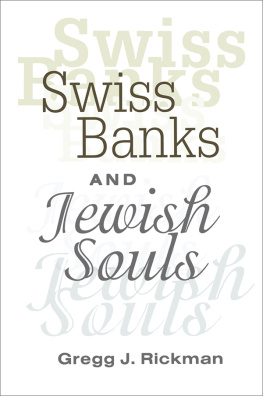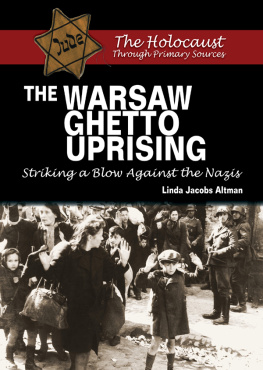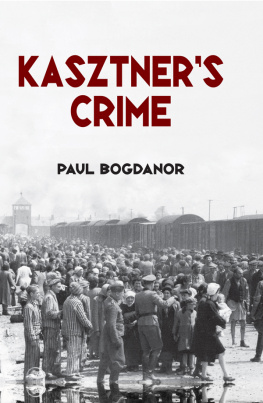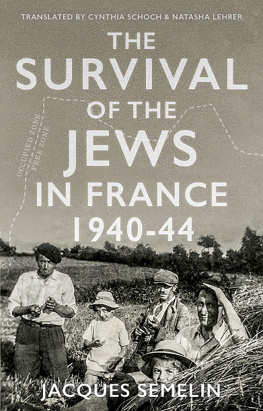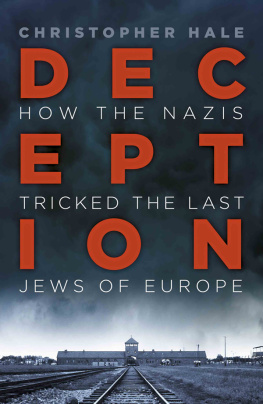First published 2007 by Transaction Publishers
Published 2017 by Routledge
2 Park Square, Milton Park, Abingdon, Oxon OX14 4RN
711 Third Avenue, New York, NY 10017, USA
Routledge is an imprint of the Taylor & Francis Group, an informa business
Copyright 2007 by Taylor & Francis.
All rights reserved. No part of this book may be reprinted or reproduced or utilised in any form or by any electronic, mechanical, or other means, now known or hereafter invented, including photocopying and recording, or in any information storage or retrieval system, without permission in writing from the publishers.
Notice:
Product or corporate names may be trademarks or registered trademarks, and are used only for identification and explanation without intent to infringe.
Library of Congress Catalog Number: 2006040468
Library of Congress Cataloging-in-Publication Data
Rickman, Gregg J.
Conquest and redemption: a history of Jewish assets from the Holocaust
/ by Gregg Rickman.
p. cm.
Includes bibliographical references and index.
ISBN 0-7658-0346-1 (alk. paper)
1. Holocaust, Jewish (1939-1945)Economic aspects. 2. Jewish
propertyEuropeHistory20th century. 3. JewsEuropeClaims
History20th century. 4. World War, 1939-1945ClaimsEurope.
5. World War, 1939-1945Confiscations and contributionsEurope.
I. Title.
D804.7.E26R53 2006
940.5318144dc22 2006040468
ISBN 13: 978-0-7658-0346-7 (hbk)
To Estelle Sapir.
Her sacrifice and endurance trumped evil and indifference and ensured justice.
I would like to begin by thanking Professor Haim Shaked of the University of Miami for his gracious help and deep interest in helping me pursue this topic as a book. From his material to personal and professional support and advice throughout the process, I owe a great debt of which I could never repay. I want to thank Professor Vendulka Kubalkova for her intellectual advice and support, throughout the time of this effort, which included illness as well as demanding professional duties. I also want to thank Professor Jaime Suchliki for his advice and support in serving as an advisor on my dissertation. I cannot forget to thank Mitch Dabach, Professor Shakeds assistant at the Sue and Leonard Miller Center for Judaic Studies for working diligently to keep tabs on my photocopied chapters as they were mailed down, and for making sure they made their way to the appropriate Professor for review. Finally, I cannot leave out a thanks to all above for their help in navigating my way through the procedures necessary to restart my quest for the Ph.D. after so many years out of the program at the University of Miami. It has all been well worth the effort and I thank them with all my heart.
If it were not for Phil Bechtel, a colleague and friend from the office of former Senator Alfonse M. DAmato, I would not have made the decision to restart my pursuit of my Ph.D. Seeking Phils advice on whether to go to law school or not, he strongly advised me to finish my degree and forget about law school. It was not worth my effort, he counseled. I am grateful for his wise instruction.
With regard to sources, above all, I must thank Abby L. Gilbert of the United States Treasury Department for her deep and abiding interest in helping me gain access to numerous documents from the bowels of the Treasury Department vaults. She was an invaluable resource and I cannot thank her enough.
There were others who provided invaluable resources, advice, and to them I am equally grateful. Among these great resources in the Washington, DC area were: Miriam Kleinman, a former colleague and good friend; Greg Bradsher, a dedicated historian and friend who is the Chief Archivist at the National Archives in Holocaust-era records; Willi Korte, the world-renown looted art provenance investigator who directed me to a number of issues of which I had not been aware; Michael Hausfeld, the attorney who both understood and practiced justice on a grand scale; Barbara Pratt, Mikes assistant who graciously helped me with access to survivors and their claims files in a number of legal cases; Michael H. Gray, of the Voice of America Library who helped me obtain much needed and difficult to find resources; Doug Bloomfield, who helped me understand a number of issues better and has fought, and continues to do so, the good fight to ensure survivors receive justice; Michael Bradfield, Paul Volckers long-time aide, who continues to advocate so strongly on their be-half and who also provided much needed information; Martin Mendelsohn, a friend who continues to push for the truth for survivors, who provided deeper insight into the complicated negotiations surrounding the various efforts; Maureen Walsh, of the Commission on Security and Cooperation in Europe, a U.S. Congressionally sponsored Commission dedicated to secure human rights for all, including survivors; and Stuart Eizenstat, with whom I am proud to have worked on this issue since its inception in the mid-1990s and who dedicated himself for the long-term and has been as strong a leader on restitution as any other.
In New York as well, there were so many to thank, including: Elan Steinberg, formerly of the World Jewish Congress, who fought long and hard, and with whom, I might have shared differences as to approach, but certainly not questions as to his dedication to the plight of survivors and of the establishment of justice; Irwin Nack, who served as an important member of the Office of Holocaust Claims in the New York State Banking Department and provided me with advice and resources on a variety of issues; Ted Poretz, of the Judah Gribetzs Special Masters Office for the Swiss Banks Settlement for resources; David Javdan, now the General Counsel of the Small Business Administration and former attorney in the law firm of, Strook, Strook, & Lavan, who along with James Shiffrin supplied me with vital resources on the Austrian banks case; and Harriet Tamen, an attorney who provided me with much needed resources on the French Railways case.
In Ohio, I cannot forget the help of Professor Gary Zola and Ina Remus, Director and Project Historian respectively, of the Jacob Rader Center of the American Jewish Archives, Cincinnati, for help as well with much needed resources.
In Israel, I must thank Bobby Brown, of the World Jewish Congress in Jerusalem, and David Akov, of the Israeli Foreign Ministry, for their help while in Israel finding important documents and setting up meetings with experts and practitioners in the restitution field.
From Austria, Hannah M. Lessing, Secretary General, National Fund of the Republic of Austria for Victims of National Socialism was very helpful in gaining further understanding a number of Austrian restitution issues.
There were a number of Professors from all over the United States and Europe that helped with resources and advice. Among them were: Professor Nicholas Onuf, Florida International University, Miami, Florida; Professor Karl Martin Born of the University of Plymouth, United Kingdom; Professor Laurent Leduc, of the University of Toronto, Canada; Professor John Torpey, of the University of British Columbia, Canada; Professor Samantha Power of Harvard University, Massachusetts; Professor Bruce Green of Cardozo Law School, in New York; Michael Bazyler of Whittier Law School, Costa Mesa, California; and Professor Gerald Feldman, of The University of California at Berkeley.


